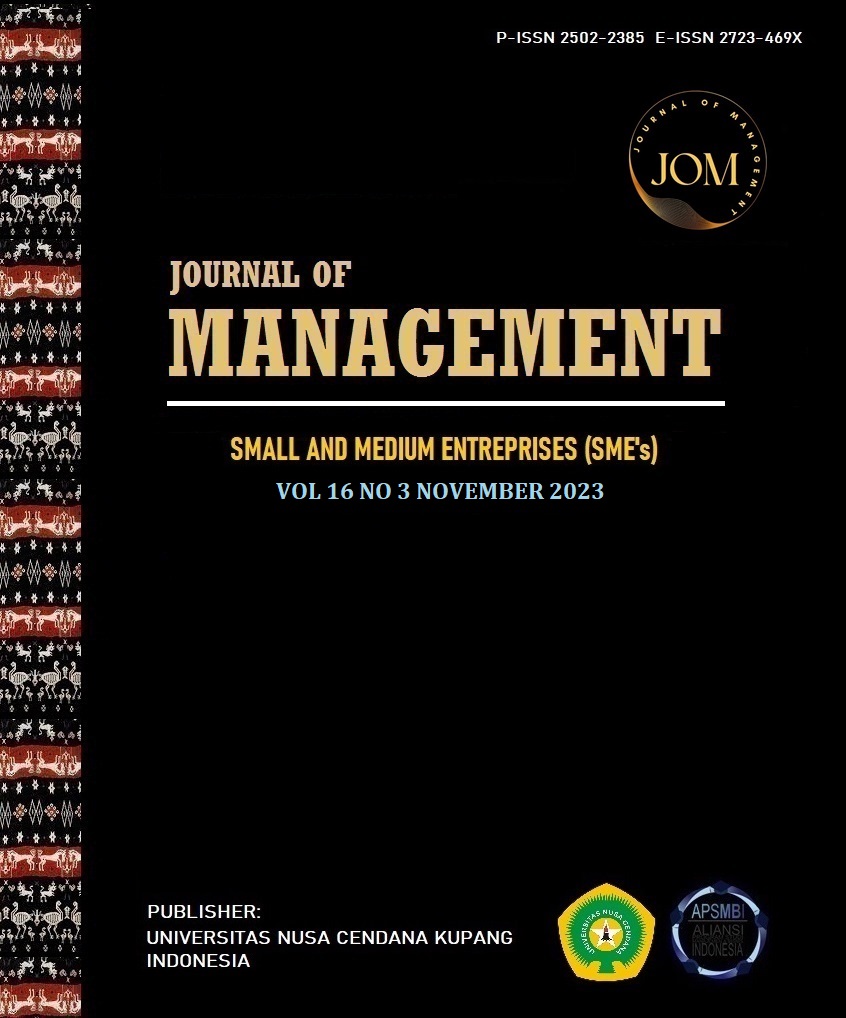FINANCIAL MANAGEMENT BEHAVIOR OF WORKING STUDENTS IN THE CREATIVE INDUSTRY IN SURABAYA
Abstract
This study examined the effect of financial knowledge and internal locus of control on financial management behavior with financial attitude as a mediating variable among working students in the creative industry in Surabaya. This study used a quantitative approach with a survey method obtained through an online questionnaire made with Google Forms. The analysis method used in this study is Structural Equation Modeling (SEM), with Partial Least Squares (PLS) using SmartPLS. Samples were chosen using the purposive sampling method so that the total sample size was 270 people. The results of this study proved that financial knowledge, financial attitude, and internal locus of control had a significant effect on financial management behavior. Also, financial attitude mediates the effect of financial knowledge on financial management behavior. However, the results of this study should be treated with caution due to the small sample size, which results in narrowing this study.
Keywords: Financial Knowledge; Financial Attitude; Financial Management Behavior; Internal Locus of Control
Downloads
References
Badan Ekonomi Kreatif. (2019). Infografis Sebaran Pelaku Ekonomi Kreatif. Direktorat Riset dan Pengembangan Ekraf. 14 May 2023.
Bamforth, J., Jebarajakirthy, C., & Geursen, G. (2017). Undergraduates’ responses to factors affecting their money management behavior. Young Consumers, 18(3), 290–311. DOI 10.1108/YC-11-2016-00645
Bapat, D. (2020). Antecedents to responsible financial management behavior among young adults. International Journal of Bank Marketing, 38(5), 1177–1194. DOI 10.1108/IJBM-10-2019-0356
Barbić, D., Lučić, A., & Chen, J. M. (2019). Measuring responsible financial consumption behaviour. International Journal of Consumer Studies, 43(1), 102–112. DOI 10.1111/ijcs.12489
Borden, L. M., Lee, S. A., Serido, J., & Collins, D. (2008). Changing College Students’ Financial Knowledge, Attitudes, and Behavior. Journal of Family and Economic Issues, 29(1), 23–40. DOI 10.1007/s10834-007-9087-2
Dew, J., & Xiao, J. J. (2011). The Financial Management Behavior Scale. Journal of Financial Counseling and Planning, 22(1).
Gerrans, P., Speelman, C., & Campitelli, G. (2014). The Relationship Between Personal Financial Wellness and Financial Wellbeing. Journal of Family and Economic Issues, 35(2), 145–160. DOI 10.1007/s10834-013-9358-z
Ghozali, I. (2013). Aplikasi analisis multivariate dengan program IBM SPSS 23 edition.
Hair, J. F., Hult, Ringle, & Sarstedt. (2017). A primer on PLS-SEM.
Huang, J., Nam, Y., & Sherraden, M. S. (2013). Financial Knowledge and Child Development Account Policy. The Journal of Consumer Affairs, 47(1), 1–26.
Huston, S. J. (2010). Measuring Financial Literacy. Journal of Consumer Affairs, 44(2), 296–316. DOI 10.1111/j.1745-6606.2010.01170.x
James, R., Bexley, E., Devlin, M., & Marginson, S. (2007). Australian University Student Finances.
Lusardi, A., Michaud, P. C., & Mitchell, O. S. (2017). Optimal Financial Knowledge and Wealth Inequality. Journal of Political Economy, 125(2), 431–477. DOI 10.1086/690950
OECD. (2009). Framework for the Development of Financial Literacy Baseline Surveys. OECD Working Papers on Finance, Insurance and Private Pensions 1. DOI 10.1787/5kmddpz7m9zq-en
OECD. (2014). PISA 2012 Results. Financial Literacy Skills for the 21st Century 6. DOI 10.1787/9789264208094-en
Qamar, M., Nadeem, K. M., & Jamil, H. (2016). The Relationship between Money Attitudes and Personal Financial Management Behavior. European Online Journal Of Natural And Social Sciences, 5, 296–308.
Ramadhan, A. Y., & Asandimitra, N. (2019). Determinants of Financial Management Behavior of Millennial Generation in Surabaya. Jurnal Minds: Manajemen Ide Dan Inspirasi, 6(2), 129. DOI 10.24252/minds.v6i2.9506
Rizkiawati, N. L., & Asandimitra, N. (2018). Pengaruh demografi, financial knowledge, financial attitude, locus of control dan financial self-efficacy terhadap financial management behavior masyarakat surabaya. Jurnal Ilmu Manajemen (JIM), 6(3).
Rotter, J. B. (1966). Generalized expectancies for internal versus external control of reinforcement. Psychological Monographs, 80(1), 1–28. DOI 10.1037/h0092976
Sandi, K., Worokinasih, S., & Darmawan, A. (2020). Pengaruh Financial Knowledge dan Financial Attitude Terhadap Financial Behavior Pada Youth Entrepreneur Malang.
Sentosa, I., & Mat, N. (2012). Examining TPB and TAM in internet purchasing using structural equation modeling. Journal of Arts, Science & Commerce, 3, 62–77.
Shih, T. Y., & Ke, S. C. (2014). Determinates of financial behavior. Service Business, 8(2), 217–238. DOI 10.1007/s11628-013-0194-x
Siswanti, I., & Halida, A. M. (2020). Financial Knowledge, Financial Attitude, And Financial Management Behavior. The International Journal of Accounting and Business Society, 28(1), 105–132. DOI 10.21776/ub.ijabs.2020.28.1.5

 Felicia Angelica Manopo(1)
Felicia Angelica Manopo(1)



